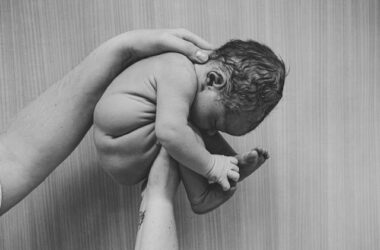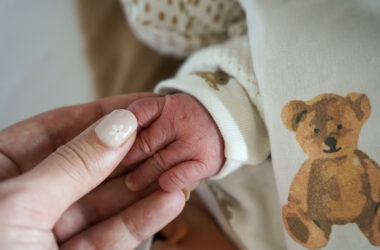When breastfeeding does not work out
Breast milk is sometimes referred to as liquid gold. Breastfeeding has a romantic image: it’s said to be the best nutrition for your child and it’s free, among other reasons why you should breastfeed. But what if breastfeeding does not work out for you or is not what you expected?
“I’m definitely going to breastfeed”
At the age of 25 and pregnant with my first child, I was absolutely convinced that I was going to breastfeed. I wasn’t really thinking about it from a romantic perspective, but simply thought it was the best choice for my child. And when my son Ravi was born – after nearly 41 weeks of pregnancy – my breastfeeding adventure began. Only it was not the adventure I had hoped for. I thought, “I’m definitely going to breastfeed.” The pump was ready in case it was needed, but I didn’t really expect it to be. At least not at first, but only after I was ready to start going out again and would have to pump or when Ravi would start daycare at three months. Why would I need a pump before that?
Postnatal week: pump, feed, supplementary feeding and repeat
Right after being born, Ravi was placed on my chest and seemed to know exactly what to do. He came into the world peeing and pooping, so he was probably hungry ;). But we noticed that he unlatched almost immediately. It was also immensely painful for me every time he latched on. Practice makes perfect, so I simply had to keep trying according to my maternity nurse. I can do this, I thought, and the pain will go away. Ravi lost a lot of weight those first few days. It’s normal for a newborn to lose weight right after birth, but should not lose more than 10% of birth weight. Ravi was already at 10% by day three – he had lost nearly 400 grammes – so we were advised to give him supplementary feeds.
Discover and stimulate your baby's mental development
Download now
So, in addition to being breastfed, he was bottle-fed and I also had to start pumping. This was to improve my milk production, as well as to create a supply of breastmilk, so I could give Ravi supplementary feeds with my own milk instead of formula. But I started dreading breastfeeding more and more because it was so incredibly painful. The pain on latch-on was horrible, but the pain also continued afterwards. This was not the magical breastfeeding experience I had imagined it would be, but more like torture.
Fever and pain: mastitis
I began to feel unwell, was shivering and had a headache. I noticed that my breast was very red and felt very hard. For a few days I had already had blocked milk ducts, but did not give it much thought because I thought this was normal. But when the maternity nurse was here, she said it was possible I had an inflammation in my breast (mastitis). After my temperature was taken and it was clear that I had a fever, it was even more likely that this was an inflammation. My GP did not give me any antibiotics because the inflammation would go away on its own. I needed to massage my breast often, cool it and above all, continue to breastfeed. As painful as breastfeeding was before the inflammation, it was now ten times as painful. I was at my wits’ end. But stop breastfeeding? No, that was not an option. Grin and bear it!
Entire days spent nursing and pumping
I had now reached the end of at-home maternity care and I desperately thought, “How I am going to do this without the nurse?”, who had helped me when latching on was difficult or with finding a good breastfeeding position. I thought, “I can’t do this on my own!” I stayed the course with breastfeeding, supplementary feeds and pumping, and this continued all day and night. Latching on became more and more difficult for Ravi, my nipples were completely raw and bleeding and I was at the end of my rope. I began to dread breastfeeding more and more. Ravi would sometimes nurse for an hour before he was finished (was there enough milk coming out?). I then pumped for half a hour and by the time I had cleaned everything, it was almost time for his next feeding.

It felt like my entire days were spent nursing and pumping. I especially dreaded nighttime feedings because I slept so little and was in a lot of pain. In fact, I cried my way through the night. My partner helped as best he could and encouraged me, but there was little more he could do. And I was not yet ready to admit that I was thinking about quitting.
Pumping problems
It often turned out that the milk I had pumped was red because my nipple was once again raw and bleeding and the blood ended up in the milk. I applied tons of calendula cream to my nipples, but it didn’t seem to help much. I called my mother in tears and she bought nipple shields and brought them over. These are a sort of silicon cover you place on your nipples to reduce pain during latch-on. I had less pain after that, but noticed that Ravi simply was having a hard time latching on and always unlatched again quickly, or it took a while before he could finally latch on properly. It made me feel very unsure of myself. Was I doing something wrong? Was I not helping him enough?
I also had to keep giving him supplementary feeds because he was not gaining enough weight, so was my milk good enough for him? And was anything coming out at all when he nursed? When I pumped, not much milk came out, but I was told that there was always less milk when pumping than when breastfeeding. But what if that wasn’t the case and Ravi was hardly getting any milk at all? Nor did I manage to pump enough milk to store it; I was barely able to pump enough milk to get through the day. I never even used the bags I had bought for freezing my breast milk. I carefully began to hint to my partner that I was considering stopping. But it was a difficult decision because breastfeeding is the best choice, right?
Getting advice from a lactation specialist
I began flirting more and more with the idea of stopping. Only I didn’t yet dare to say it aloud because I felt like a failure. I needed to give it another shot, so I decided to go to the lactation specialist who worked at our local midwife practice one day a month. Ravi was four weeks old at this point and had just reached his birth weight again (he had a nice weight of 3810 grammes at birth). The lactation specialist examined Ravi and watched how he latched on and nursed. She then told me that Ravi’s tongue-tie was too short, which was why he had difficulty latching on. The reason I experienced so much pain was because he was simply unable to latch on properly and this was why my nipples were so sore. This probably also meant that he was not getting enough milk, which was why I had to nurse for so long each time. To solve this problem, we could cut Ravi’s tongue-tie. This would make his tongue-tie longer and it would be easier for him to latch on.
The final decision
I talked to my partner about cutting his tongue-tie. Ravi would then be better able to breastfeed, as well as drink from a bottle. He had no problem at all with bottle feeding at this point and was able to quickly drink the pumped milk without a problem. Somewhere in the back of my mind, even before going to the lactation specialist, I considered simply stopping. It was not an easy decision to make and we had to work our way through feelings of guilt, but we chose to stop breastfeeding and not cut his tongue-tie. I would continue to pump so that I could feed him my breast milk with a bottle. A huge weight lifted from my shoulders and I felt a tremendous sense of relief. It was only at that moment that I realised how extremely sad and depressed I had been feeling.
I felt like a failure because I was not able to breastfeed my child, while all around me were plenty of women who did not seem to have any problem at all with nursing. After making this decision, I became a much happier and relaxed mother. I finally started to like being a mum, nights were much easier and I could enjoy motherhood. I pumped for another few weeks, but my milk supply quickly started to decrease and less and less milk came out. From that point on I switched completely to formula and I started noticing that Ravi began to grow quickly. Stopping breastfeeding was a good decision, not only for me, but also for Ravi. Breastfeeding can be a positive experience and great for your child, but not always. And that’s just fine!


Breastfeeding a second baby
When Ravi had just turned one, I found out that I was pregnant again. From that moment, I started to think about breastfeeding. For the entire pregnancy, I was not sure if I wanted to try it again. After the first meeting with the maternity nurse, who told me I would receive fewer maternity care hours if I didn’t breastfeed, I decided to give it a try. But I made clear that I did not want to pump. When Tara was born, I began breastfeeding her right away. She latched on well and both the maternity nurse and midwife said that Tara did not have a short tongue-tie. So, there was no reason why breastfeeding would not work out this time. On day two after birth, I noticed I was feeling extremely low and did not look forward to nursing – even though breastfeeding was so much easier than with Ravi. It hurt, but that’s apparently normal at first. But I was feeling very unhappy and I recognised the feeling I had for weeks on end with Ravi.
On day three, I said to my partner and the maternity nurse that I was going to stop breastfeeding. The maternity nurse said that she had a feeling I was going to say that. I already had formula in the house just in case, so we started to bottle-feed Tara. From that day on, my postnatal experience was a wonderful and positive one. This is the mother I always wanted to and knew I could be! A few years later, my third child, Loua, was born. She was fed formula from day one.
Be kind to yourself!
Even though I was very happy with the decision, I felt guilty for a long time about stopping breastfeeding. Luckily, it was much easier for me to make this decision with my second child, and I noticed that a happy mother is much more important that being successful at breastfeeding. So, to all you mums who are unable to breastfeed for whatever reason, it is not your fault. Don’t feel guilty! After all, our formula-fed children will also grow and develop normally. Do what feels right for you and not what society expects of you. A happy mum is a happy baby!
Lots of love,
Maron
Mum to Ravi, Tara and Loua
Did this article help you?
Share this article
Receive a notification at the start of a leap!
Would you like to be prepared when your baby is about to enter a leap? Sign up for our leap alarm for free and always receive a notification when a leap is about to start!




